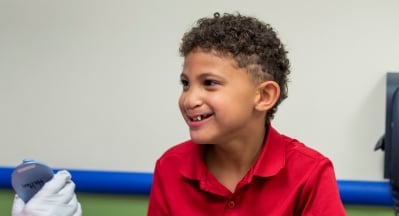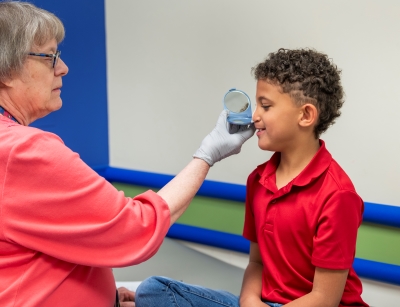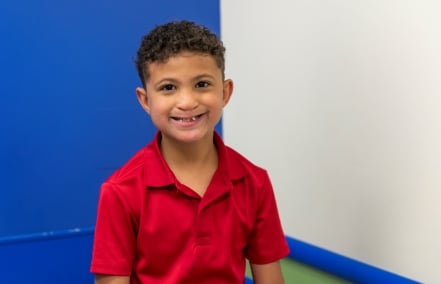Cleft Lip and Palate Program

Cleft Lip and Palate Program

Our comprehensive team follows more than 1,500 children born with cleft lip/palate. The Frederick J. McCoy Cleft and Craniofacial Clinic is recognized by the American Cleft Palate-Craniofacial Association and follows its protocols.
Cleft palate is a complex condition in children and can affect many areas of health including feeding, growth, speech, and more. The Cleft Palate team at Children’s Mercy is among the most experienced teams in the nation, treating more patients than any program in a six-state region and we excel in treating all areas of cleft lip and palate.
Our approach to care
For your first visit, your child will be seen by a board-certified, fellowship-trained pediatric plastic surgeon, and other highly trained pediatric providers. Your care team also may include specialists in dentistry, ear, nose, and throat; genetics, and other clinical departments to provide comprehensive diagnostic and treatment services. Families have access to the full range of services provided by a world-class children’s hospital, so all aspects of a child’s development can be addressed.
Through our expertise, our team helps minimize patient recovery time by using innovative, less invasive approaches to surgery. During your child’s surgery, a highly trained pediatric anesthesiologist who has experience in administering anesthesia precisely for the child's age, size, and condition will also be present.
What to expect

We provide prenatal consults to parents who are expecting a child with a cleft lip or palate and educate families so they feel empowered to handle feeding, holding, and other important elements of the first days of a child’s life.
Families are paired with a surgeon at their first appointment to ensure consistent care and a point of contact throughout the care process. We then work to see babies within a few days of birth, and we encourage parents to send photos of their child immediately after birth so we can work to begin a treatment plan. In doing so, we hope to provide peace of mind to families during what is often a busy and stressful time. Families can preview surgery results through innovative 3D rendering technology, giving them a sense of how the surgery will benefit their child.
In addition to infants, our team works with older children who transition care from another provider or need further treatment. We also provide pre-adoption counseling for families planning to adopt children with cleft lip and palate, including children from overseas.
Cleft palate research and innovation
Patients also benefit from an innovative blood conservation program, which greatly reduces the need for blood transfusions during surgery. And our social workers provide ongoing support and access to community resources.
We are one of the few centers in the region to offer nasoalveolar molding (NAM) to treat cleft lip and palate. These devices are similar to retainers and re-shape the nostrils, gums, and lips of children. NAM can reduce the number of surgeries your child will need.
Pediatric anesthesia at Children's Mercy
At Children’s Mercy, a pediatric anesthesiologist is an active member of your child’s care team before, during and after their surgery or procedure. We administer anesthesia for more than 27,000 kids per year—that’s 74 per day—so our team is experienced at finding just-right doses of medication for kids of all sizes. During the procedure, your anesthesiologist will carefully monitor your child’s heartbeat, blood pressure and breathing. Afterwards, your anesthesiologist will make sure your child wakes up as comfortably as possible and continue to help with pain control. Learn more about pediatric anesthesiology at Children's Mercy.
-
Our multidisciplinary cleft palate/craniofacial team includes specialists in:
-
Dentistry
-
ENT
-
Genetics
-
Hearing and Speech
-
Lactation Support
-
Nursing
-
Nutrition
-
Plastic Surgery
-
Social Work
-
-
Additionally:
-
Families can preview surgery results through innovative 3D rendering technology.
-
Patients benefit from an innovative blood conservation program, which greatly reduces the need for blood transfusions during surgery.
-
Families planning to adopt children with cleft lip and palate can access pre-adoption counseling.
-
Our social workers provide ongoing support and access to community resources.
-
Conditions
Including, but not limited to the following (listed in order of frequency)
-
Cleft palate
-
Craniofacial anomalies/syndromes
-
Craniosynostosis
-
Cleft lip
-
Hypernasality/hyponasality
-
Conditions of the jaw
Cleft lip and palate
We use a comprehensive approach to treating children with cleft lip and palate of all ages. Our team provides individualized care plans and long-term follow-up support. We also provide consultations through our Fetal Health Center when babies are diagnosed with cleft lip or palate within the womb via sonogram.
Craniosynostosis
Our team treats all types of patients with fused skull sutures. Patients are cared for by a group of experts that includes plastic surgeons, neurosurgeons, and geneticists. We offer the latest techniques, including minimally invasive approaches to surgery.
Ear deformities/microtia
We offer reconstructive surgery options for the full range of potential ear deformities, from protruding ears to partial or complete absence of ears. Our team also provides molding shortly after birth and surgical solutions later in life.
Skull anomalies and asymmetries
We evaluate and treat all types of abnormal head shapes and provide a full range of surgical and nonsurgical treatment options.
Facial asymmetries/underdevelopment and hemifacial microsomia
Our team specializes in treating all types of facial asymmetry. Depending on severity, we can perform bony (jaw surgery, facial implants) and soft tissue (fat grafting, free-tissue transfer) procedures to gain symmetry.
Malocclusions/jaw anomalies
We work with your child's orthodontist to perform jaw surgery to correct all types of jaw conditions including overbite, underbite, small chin, and gummy smile.
Pierre-robin sequence
The management of Pierre-Robin Sequence, or small jaw with respiratory obstruction, requires a collaborative approach to patient care that includes pediatricians, otolaryngologists, and plastic surgeons. The patient's care plan is developed after extensive evaluation of the airway and other systems. Surgical treatment, such as jaw distraction, is sometimes part of the care plan.
Traumatic deformities of the face and skull
We provide dental and craniofacial surgical expertise to treat all types of facial and head injuries. From jaw surgery to augmentation with facial implants or fat, every patient will have access to the possible available treatment for their condition.
Syndromes
Our team provides care for craniofacial syndromes such as Apert's, Crouzon's, Goldenhar's, and Treacher-Collins. Our organized approach involves multiple specialties. And care is provided for patients ranging from birth to adolescence.
Tumors of the craniomaxillofacial skeleton
From oral and jaw pathology to skull and cranial base tumors, our specialized team has expertise to treat and reconstruct a variety of conditions.
Vascular anomalies
We treat all types of vascular anomalies from hemangiomas to vascular malformations through medical, interventional, and surgical therapies.
Velopharyngeal insufficiency, nasal speech
Patients with cleft palate often experience speech and nasal problems. We offer surgical solutions for these conditions in coordination with a team of speech therapists, otolaryngologists, dental specialists, and plastic surgeons. Learn more about the velopharyngeal dysfunction program at Children's Mercy.
Hartsfield syndrome and bilateral cleft palate: Hezekiah’s story
One-of-a-kind Hezekiah needs one-of-a-kind complex care, and he receives that care from the Cleft Lip and Palate Program at Children's Mercy Kansas City. Dedicated providers in many departments collaborate to support Hezekiah and his family through reconstructive surgeries and other health challenges.

Cleft lip and palate: Joaquin's story
Shao Jiang, MD, pediatric plastic surgeon, repairs Joaquin’s previous cleft lip and palate surgery, which was performed in another country. Dr. Jiang’s goal is to reduce scarring and improve function for Joaquin.
The inspiration behind our clinic
The transformative care at our cleft palate and craniofacial program is made possible thanks to the generosity of Frederick J. McCoy.
